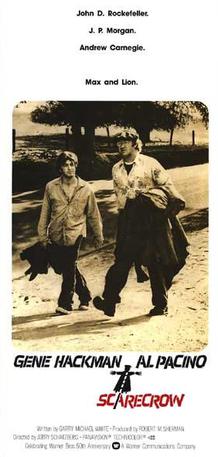 |
| SCARECROW (1973), which I watched the other day with my buddy Kelly Greene, is one of a series of small budget, almost independent pictures that were produced in the late '60s and early '70s. It's a road picture about two mismatched drifters pursuing an impossible dream. It's a naturalistic film, shot entirely on location but it's a character study with no real plot to speak of and it ends on an abrupt, depressing note. Clearly the people involved in this project had other such similar films in mind when they made SCARECROW. It's influences and antecedents include OF MICE AND MEN, EASY RIDER, MIDNIGHT COWBOY, FIVE EASY PIECES, TWO LANE BLACKTOP, THE LAST DETAIL and other similar films of the era. Almost all of those films featured strong actors in meaty character roles in films that were shot on location (keeping production costs down). The leads in these films (SCARECROW included), are almost all losers, disenfranchised and dispossessed anti-heroes at odds with modern life and society. And almost all of these films (SCARECROW included) are incredibly depressing. There's a helluva lot of great talent involved in SCARECROW. For starters, you've got Gene Hackman and Al Pacino in the leads. Both actors were red hot at this point in their respective careers. Consider this: Hackman had already received two Best Supporting Actor nominations (one for BONNIE & CLYDE (1967), the other for I NEVER SANG FOR MY FATHER (1970) ) and had won a Best Actor Oscar for THE FRENCH CONNECTION (1971). Al Pacino had a Best Supporting Actor nomination in his pocket for his work in THE GODFATHER (1973). Both men go to town with their characters but I found Hackman's performance as Max, an ex con with anger management issues who dreams of opening a car wash in Pittsburgh, to be the better of the two. I thought Pacino, as Lion, an ex-sailor who wants to see his child for the first time, over-acted and mugged in too many scenes. Director Jerry Schatzberg had previously directed Pacino in THE PANIC IN NEEDLE PARK (1971) (there's another depressing '70s film for you). His direction here consists of incredibly long takes in which he's afraid to cut from either of the stars. These long, wordy scenes tend to become a drag on what little forward momentum the narrative has. Some judicial cuts here and there to tighten things up would have helped but I suspect both Hackman and Pacino wanted all of their scenes kept intact. The film is beautifully shot by Vilmos Zsigmond who scored a Best Cinematography Academy Award nomination for MCCABE AND MRS. MILLER (1971) and won a Best Cinematography Oscar for CLOSE ENCOUNTERS OF THE THIRD KIND (1977). His other films of the period include DELIVERANCE (1972), THE LONG GOODBYE (1973) and THE SUGARLAND EXPRESS (1973). So with that kind of talent both in front of and behind the camera, you'd expect SCARECROW to be better than it is. It's not a bad film if you enjoy watching wonderfully photographed character studies of two of life's losers.But if you're looking for a film with a plot and a real story to tell, you won't find it here. |
No comments:
Post a Comment